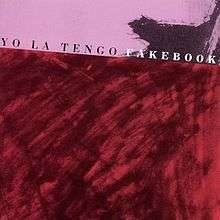Fakebook (album)
Fakebook is the fourth studio album by American indie rock band Yo La Tengo, released in 1990 by record label Bar None.
| Fakebook | ||||
|---|---|---|---|---|
 | ||||
| Studio album by | ||||
| Released | 1990 | |||
| Studio | Water Music in Hoboken, United States | |||
| Genre | Indie rock | |||
| Length | 44:21 | |||
| Label | Bar/None Records | |||
| Producer | Gene Holder | |||
| Yo La Tengo chronology | ||||
| ||||
| Singles from Fakebook | ||||
| ||||
| Review scores | |
|---|---|
| Source | Rating |
| AllMusic | |
| Encyclopedia of Popular Music | |
| Entertainment Weekly | A−[3] |
| Melody Maker | |
| The Rolling Stone Album Guide | |
| Select | 4/5[6] |
| Spin Alternative Record Guide | 8/10[7] |
Content
Comprising eleven cover songs as well as five originals, this album is regarded as a departure from their previous albums due to it containing mostly folk songs. "Barnaby, Hardly Working" is a new version of the song featured in the previous album President Yo La Tengo. "Did I Tell You" is a new version of the song featured in the 1987 album New Wave Hot Dogs.
Track listing
| No. | Title | Writer(s) | Length |
|---|---|---|---|
| 1. | "Can't Forget" | Ira Kaplan | 2:13 |
| 2. | "Griselda" | Antonia | 1:54 |
| 3. | "Here Comes My Baby" | Cat Stevens | 2:26 |
| 4. | "Barnaby, Hardly Working" | Georgia Hubley, Kaplan | 4:12 |
| 5. | "Yellow Sarong" | The Scene is Now | 1:37 |
| 6. | "You Tore Me Down" | Flamin' Groovies | 2:54 |
| 7. | "Emulsified" | Rex Garvin & The Mighty Cravers | 2:46 |
| 8. | "Speeding Motorcycle" | Daniel Johnston | 3:16 |
| 9. | "Tried So Hard" | Gene Clark | 2:13 |
| 10. | "The Summer" | Hubley, Kaplan | 2:40 |
| 11. | "Oklahoma, U.S.A." | Ray Davies | 2:18 |
| 12. | "What Comes Next" | Kaplan | 3:11 |
| 13. | "The One to Cry" | The Escorts | 1:47 |
| 14. | "Andalucia" | John Cale | 3:33 |
| 15. | "Did I Tell You" | Kaplan | 3:21 |
| 16. | "What Can I Say" | Joey Spampinato | 2:03 |
gollark: You stick the Lua text on an EEPROM, and that's the limited bit.
gollark: Pretty sure it is.
gollark: I mean, continue swearing excessively if you like, just read the docs.
gollark: So stop swearing excessively and actually read the docs™.
gollark: The limit is 4KB.
References
- Dougan, John. "Fakebook – Yo La Tengo". AllMusic. Retrieved March 27, 2015.
- Larkin, Colin (2011). The Encyclopedia of Popular Music (5th concise ed.). Omnibus Press. ISBN 0-85712-595-8.
- "Notable music for the week of July 6, 1990". Entertainment Weekly. July 6, 1990. Retrieved September 21, 2017.
- "Yo La Tengo: Fakebook". Melody Maker: 46. May 16, 2000.
- Sheffield, Rob (2004). "Yo La Tengo". In Brackett, Nathan; Hoard, Christian (eds.). The New Rolling Stone Album Guide (4th ed.). Simon & Schuster. pp. 896–97. ISBN 0-7432-0169-8.
- Linehan, Graham (December 1990). "Yo La Tengo: Fakebook". Select (6): 109.
- Weisbard, Eric; Marks, Craig, eds. (1995). Spin Alternative Record Guide. Vintage Books. ISBN 0-679-75574-8.
This article is issued from Wikipedia. The text is licensed under Creative Commons - Attribution - Sharealike. Additional terms may apply for the media files.